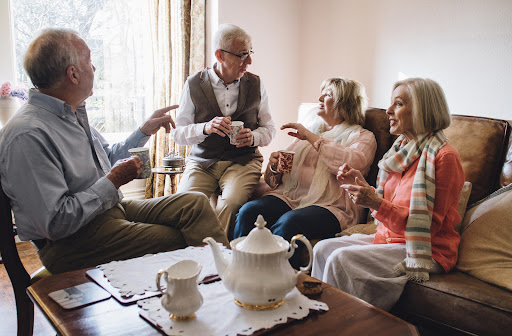Humans Are Social Beings
Famous Greek philosopher and scientist Aristotle once wrote, “Man is by nature a social animal.” Although human history has come a long way since Aristotle’s heyday, even modern scientists agree that humans are social beings. Belonging to a community and engaging with other people is how we thrive.
Yet, as we age, we tend to lose social connections. As a result, older adults are left alone more often, leading to social isolation and loneliness. Additionally, the physical limitations of age can sometimes reduce how many events or activities are accessible in the larger world. However, there are still many opportunities for seniors to enjoy socializing.
Social connections are also crucial for forming and retaining healthy habits.
The Harm of Social Isolation
Many adults age 50 and older are vulnerable to social isolation and loneliness. A lack of social connection increases health risks. Notably, recent studies into the social relationships of older adults found that:
- Social isolation significantly increased the risk of premature death from all causes.
- Social isolation can increase the risk of developing dementia by about 50%.
- Poor social relationships & loneliness can increase the risk of heart disease by 29% and stroke by 32%.
- Prolonged loneliness leads to higher rates of anxiety, depression, and suicide.
- Loneliness increases the risks associated with heart failure. Patients have a 4 times higher risk of death, 68% increased risk of hospitalization, and 57% increased risk of a required emergency apartment visit.
Loneliness increases the risks associated with multiple physical and mental health conditions. In addition, social isolation can contribute to cognitive decline, including Alzheimer’s disease.
Obstacles to Social Connection
It’s worth noting studies have distinguished physical isolation from loneliness. In other words, you can be standing in a crowded room and still feel alone. However, the opposite is also true! If you feel connected, you might be physically isolated by socially satisfied.
Some of that difference can be attributed to personality. For example, some introverted people need less social stimulation or become overwhelmed by crowds. Conversely, too much quiet time can feel suffocating for more extraverted individuals.
However, even introverts can feel lonely. Everyone has a balance of socializing and quiet time necessary for physical and mental health. For seniors, that balance can sometimes shift, changing from what worked when they were younger.
Older adults experience more obstacles that can limit their choices about when and where they want to seek connection. For example, limited transportation or mobility problems can cause physical isolation. Seniors may also find themselves unexpectedly alone, such as the death of a spouse or younger family members moving away.
Seniors need more social capital. Close community support and transportation availability are crucial for increasing access to social choices. When seniors have more opportunities to connect, they can enjoy quality interactions.
Higher levels of social interaction are essential for health in older adults—even peripheral interactions. Waving to a neighbor, catching up over coffee, or joining cheers during a sports game—it all adds up.
The Benefits of Social Connections
High-quality social relationships can help seniors live longer, healthier lives. By engaging in meaningful, productive social activities, seniors experience multiple benefits, including:
- Boosting mood & mental health
- Improving cognitive function
- Living longer (reducing health risks)
- Maintaining general wellbeing
Phones and video calling are helpful tools for maintaining a long-distance relationship. But face-to-face socializing has the most significant benefits. Being physically close to someone can reduce stress levels and increase trust. Face-to-face social interactions can also act as powerful motivation.
Joining a friend, a neighbor, or a group can motivate individuals to participate in physical exercise. It can be challenging to inspire yourself when feeling lonely or experiencing aches and pains. However, you feel supported when someone comes along for the ride (or the walk).
A workout buddy, or social outing buddy, can motivate seniors to:
- Be adventurous: Trying new things or continuing an activity you love is easier when you feel supported.
- Be consistent: When someone else is counting on you to show up, you’re more likely to keep up your healthy habit.
- Be motivated: Having someone cheer you on or inspire some friendly competition can make exercise a positive experience.
Social contact can also protect the brain from neurodegenerative diseases. Interacting with other people trains our brains and improves memory formation. So we’re motivated to learn not for ourselves but to support our relationships.
Join a Socially-Active Community
Joining a socially-active community can provide seniors with more quality social connections. The All American community in Enfield offers our residents a wide variety of experiences. We aim to provide meaningful engagement, so all our community members can find something they love.
There’s always something to do, so our residents can have their pick of activities and events. In addition to exercise and physical activities, we also organize programs to meet our residents’ emotional, intellectual, and spiritual needs.
We invite you to schedule a tour to see our thriving community firsthand. Contact us today to learn more about the All American Way!




